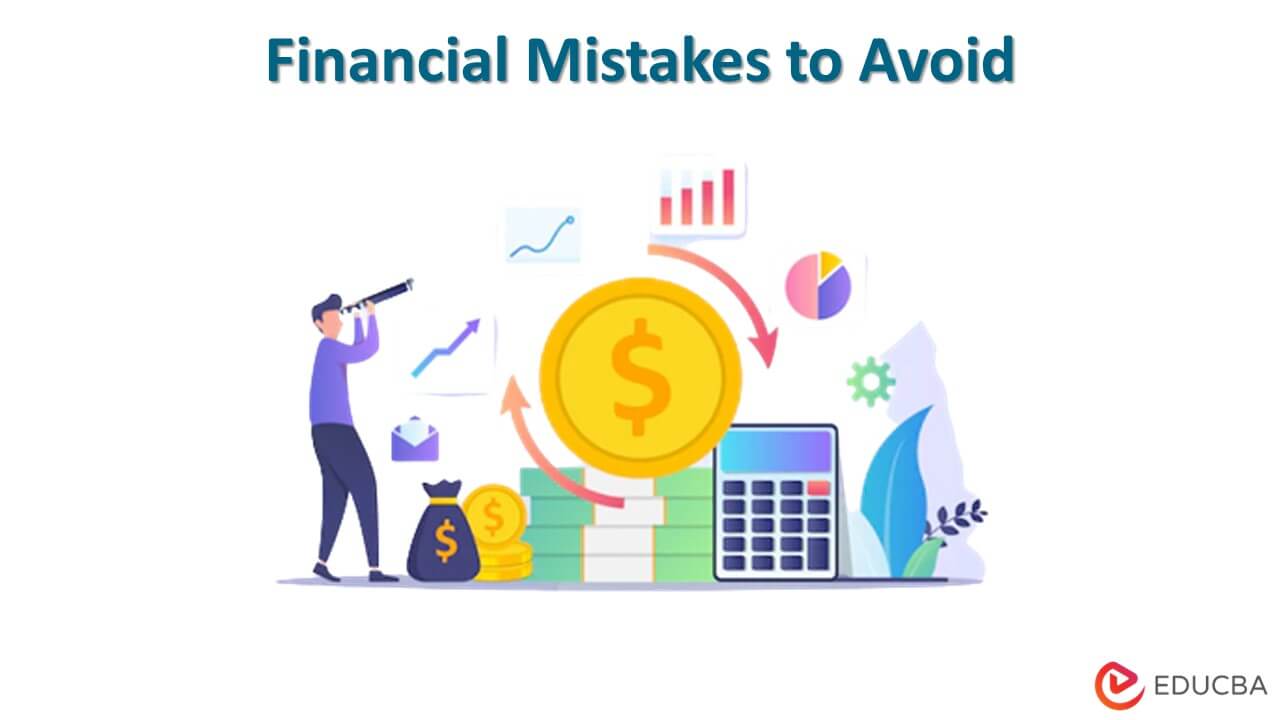Updated April 19, 2023
Introduction to Financial Mistakes to Avoid
People who change careers often forget about things they should remember. The biggest example is their financial life. If they do remember and get aware of how their financial life is going, they won’t make these financial mistakes that cost them too much later in their life.
We all need money to run our families, pay the bills, and make things tick. Without money, it’s difficult to afford a good life in society. Thus, even if you’re going for a career change, you need to be aware that you don’t make any financial Planning mistakes along the way.
In this article, we will talk about financial mistakes you may make that will be expensive. Why? Because we want you to make, your career change smoother! On the one hand, you would be happy making the transition you always wanted; on the other, you wouldn’t find peace of mind.
If you read this article and apply whatever we’re going to offer, you can avoid costly financial Planning mistakes during any career change.
Financial Mistakes You Need to Avoid
Let’s start with some of the Financial Mistakes you must avoid.
-
Quitting your current job too soon
You may not consider as one of the biggest financial mistakes, but it is. Most people talk about quitting their day job, starting their own businesses, or switching to something new. But in reality, they are not easy, especially when you have a family to feed, pay bills, and take care of yourself and your family. Even if you have a plan of action, don’t quit the job right now. First, do some due diligence in the market. Deciding to shift is great. But you need to take some time and think long-term. You must consider how your decision would affect your family’s financial destiny. Ask yourself – If I don’t earn another year, do I have enough finance to run my life, feed my family and pay the bills? If not, don’t quit. Don’t make this new-hype-cool choice because, at last, it will be counted as one of your career’s biggest financial Planning mistakes.
-
Not saving
Yes, many people don’t think about the uncertain future they may face in the years to come. The career you’re transitioning to may not be a good one. What would you do then? It’s not a fearful thought. It’s pro-activity. You need to be proactive so that you don’t make most of the financial mistakes most people make. Once you decide to change your career, simply take a piece of paper and devise a plan. How much money would it take to make a career shift? It’s usually recommended that you save at least one year of living expenses before you make the shift.
One year is enough time to get a new job in your new work domain. But here’s the catch. Most people just submit their resignation letters without considering their future prospects. Yes, a few people have succeeded in doing that, but that may be a very small percentage of people. If you want to ensure that you want a good night’s sleep and a thriving career, then start saving now (if you don’t have any savings yet). Create some emergency funds. Your financial life is as good as the money you don’t need to touch. So, be wise. Don’t make these costly financial mistakes. One of them is quitting your job without saving at least a year.
-
Not thinking about the earning potential of the new job
Few jobs don’t pay well. Even if you become extraordinary at the skills you need, you will not get paid more than a fixed amount. Why? Because all skills are not valuable in the market. Doing yoga is not a valuable skill in terms of money. If you are an expert in yoga, you can teach yoga, but until you open a yoga studio or engage a bunch of people to come to your studio to practice yoga, you won’t get paid as much as you want to get paid. There’s the ceiling. So, before switching your career, you need to think about whether future job prospects will meet your current need or not. If not, think again. You may not need to jump right in to shift from your already well-paid job.
This is daily negligence that you make in terms of your finance. And you know, not thinking about the earning potential is one of the biggest financial mistakes. Just by the spur of the moment, you decide to do something. But think how it would affect your financial life and, as a result, your extended family. Won’t you consider thinking about your family and their current lifestyle?
-
Investing too much into a program for making a new career
A lot of mid-level executives make this sort of mistake. They think that doing this course will earn them much, much more than they’re currently earning. But the thing is, often, this decision to invest too much into a program backfires. Imagine deciding to do a full-time MBA in the middle of your career. Now a good MBA costs a fortune. You take a loan, pay the institute, and take care of the family. But think, what if you don’t get a job with enough money after the MBA? What then? It’s called “contingency thinking”.
Doing this before investing too much money will save you from making one of the fatal financial mistakes. Think this way. There’s an opportunity cost for everything. When you decide to invest a fortune into your course, you also decide not to work during that time. As per our current example, if you do MBA, you won’t be able to work for 2 time. Now don’t only think about how much you invested into your MBA. But add also the earning lost. And then think, if you get a job of a decent amount, how much time would it take to hit the break-even? If you find anything beyond your reach, stop right there.
When you plan, consider your family members depending on you for finance. Switching a career and going for passion sound too good when you think, but you also need to find the sweet spot between what works and what you’re passionate about. Otherwise, making one of the worst financial mistakes during your transition from one career to another is given.
-
Spending too much
This is one of the most critical financial mistakes you’re making if you’re trying to shift your career. Most people don’t want to reduce their expenditures because they feel stuff makes them happy. But it’s not about stuff; it’s about how you use your money to buy stuff that you don’t need to buy. To make things easier, here’s what you should do. First, realize that you’re spending too much money. The best way to note this is to ask yourself how much of the money you’ve set aside for saving or investment. You’re expending too much if it’s anything less than 10% of your monthly income. We know that the more you can save during the transition, the better it is. But still, more than 90% of spending is too much. Second, make two lists – one, the need list, and two, the want list.
The need list is the list of things you need to run your life – the groceries, the things you need to buy, the bills you need to pay, and so on and so forth. Now, you need to think about the want list. The want list includes everything you want to buy or will feel nice to have but not at all necessary for daily life. Now, you need to think about what you most emphasize every month. And that makes all the difference. If you’re more concerned about your need list, you will remain frugal; otherwise, you know better. Financial Planning mistakes are not giant mistakes. They are the pile of mistakes put together day in and day out. So, save yourself from making critical financial mistakes. Save more than 10% (ideally 30% of your monthly income) for transitioning to a new career.
-
Not having a financial plan
This is big. We can say this is one of the biggest, fatal, and most critical Financial Planning mistakes you can make when thinking about a career change. This is the big one because once you miss out on planning you will ensure that you will fail in terms of money, or else you will make some Financial Planning mistakes you don’t want to make. If you want to make a career changeover, here is what you shouldn’t do. You shouldn’t let your financial life slide by default. Rather plan out every tiny expense, earnings, savings, and investment. If you plan, you have one major benefit – you will be ready if things go wrong.
Transitioning into a new career requires much effort, time, research, money, skill investment, and sacrifices. But make sure these things should not affect you financially. Here’s what you should do. First of all, don’t save and invest after spending. Do the saving and investment first. Decide how much percentage of amounts you would save and invest. Automate the system. Every month when you receive the amount in your bank, it will automatically deposit into your savings account. You don’t need to worry about anything else. You only need to run your family with the money left after savings and investments. Why are we putting more emphasis on savings and investment? While trying new things, you may not always know how everything will go in advance. Thus, preparation is required if any rainy season arrives.
-
Not taking care of the tax
No matter what you do, don’t ignore your taxes. You don’t need to worry about taxation on your own. Simply outsource it to someone who is an expert in this field. Financial Planning mistakes are defined as mistakes that are costly in the long run. The government will not listen to your pleading if you don’t pay the taxes. Talk to an expert in this field. Tell me about your new career and earning. And then make everything done legally. Don’t take risks with your taxation part. Otherwise, you may suffer a lot later in your financial life.
-
Not thinking about finance for a long period of time
If you’re transitioning to a new career and you know that it would pay you well. But the future is unseen. You don’t know what’s in store for you. So, think long-term. What works for now may not work after 10 years. You need a solid financial base to advance and make something out of your career. Not thinking about finance for a long period of time is one of the worst financial mistakes because people think only about the short term and make a decision. It’s wrong and can create havoc if you don’t think beforehand.
The above are the financial mistakes you should avoid. You may think these financial mistakes are obvious, but they are not. This is the list of worst financial mistakes people make while shifting from one work domain to another. And if you pay it, you will see that the most obvious things are always ignored. Money is important. And if you don’t take care of money who else will?
Financial Planning mistakes are such that once you make them for years, it’s difficult to come back and repair your mistakes. Thus be aware of them from the beginning. Have a plan handy to avoid these financial mistakes. If your finance is in proper order, transitioning from one career to another will become much easier.
Recommended Articles
This is a guide to Financial Mistakes to Avoid. We have discussed a brief overview of the 8 Worst Financial Mistakes to Avoid during any career change. You may look at the following articles to learn more –





